› Forums › 2022 Autumn Courses › Reading-Year56-Wed(UK)
- This topic has 123 replies, 7 voices, and was last updated December 28, 2022 by
Beth.
-
AuthorPosts
-
-
at 19:20 #26425
Beth
ParticipantSummary for Lesson 1
In today’s class we began our study of The Time Machine by H. G. Wells, thinking about the context and history of the book and what it can tell us about the ideas in the novel. We began with a class review of the book, where the students shared their ideas beautifully on what they did and didn’t enjoy in the novel. We then moved on to discussing the science fiction genre, analysing the key conventions of the genre and thinking about why it may have arisen from the 19th century and industrial revolution. We then learned about Wells’ life, discussing what impact his childhood poverty may have had on his writing and predicting elements of his personality from his interest in science and extrapolated vision of the future. Finally the class thought about what the book was saying about society in order to help inspire their own ideas for a modern version of the novel, developing sci-fi ‘what if’ questions based upon the technology of today, which they did fantastically. Great work from everyone today- the class was enthusiastic and thoughtful in today’s lesson, coming up with some excellent ideas. Well done everyone for your passionate and diligent work today- see you next week! 🙂
Themes video: https://www.youtube.com/watch?v=XS_RPRKyaLY
Homework
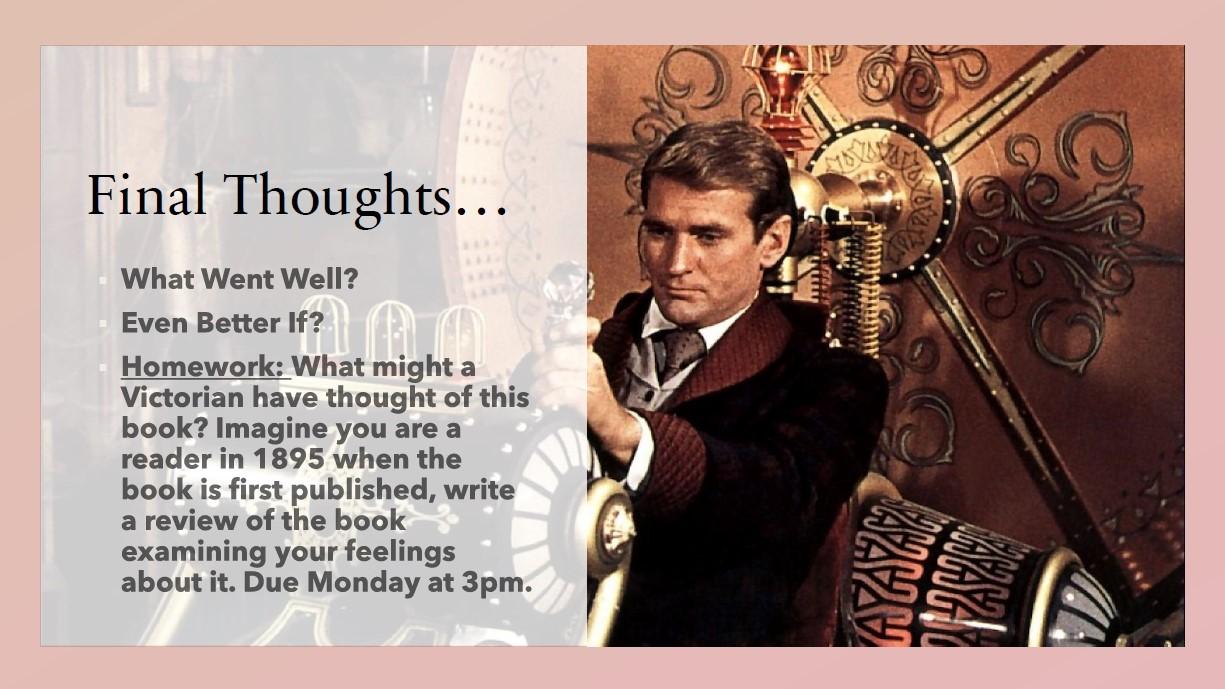
Attachments:
You must be logged in to view attached files. -
at 20:51 #26427
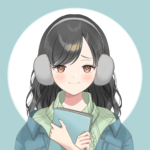 YunshuParticipant
YunshuParticipantDear Beth,
Please find my homework attached. The lesson was very interesting and I enjoyed the discussions.
Kind Regards,
Yunshu
Attachments:
You must be logged in to view attached files.-
at 16:31 #26530
-
-
at 21:10 #26449
 EmiliParticipant
EmiliParticipantHi Beth,
this is my homework attached. thanks
Attachments:
You must be logged in to view attached files.-
at 16:39 #26532
-
-
at 11:09 #26458
 𝐉𝐞𝐬𝐬𝐢𝐞Participant
𝐉𝐞𝐬𝐬𝐢𝐞ParticipantHi Beth,
Here is the homework I have completed, it is attached below,
Many thanks,
Jessie
-
at 11:11 #26459
-
-
at 22:41 #26473
Adrian
ParticipantDear Beth,
Here is my home work
Thank You
Adrian
Attachments:
You must be logged in to view attached files.-
at 16:43 #26534
-
-
at 21:20 #26489
 𝐉𝐞𝐬𝐬𝐢𝐞Participant
𝐉𝐞𝐬𝐬𝐢𝐞ParticipantDear Mr H.G Wells,
Having bought your latest science-fiction novel -The Time Machine- I have experienced mixed feelings for your rather unique book. In this letter, I will express my likes and dislikes about this intricate piece of writing you have produced.
Firstly, I would like to praise you with many plaudits. The story, which has quite an intriguing plot. The time traveller, who claims that he has invented a bicycle-like device that enables him to travel through time in which he has visited the future (in the year 802,701). There, he finds the future human species which have “evolved” into two distinct forms, the Eloi—gentle, fairy-like, childish creatures, whose existence appears to be free of struggle and the Morlocks, underground dwellers, who now feed on the feeble, defenceless Eloi.
Now, here I would like to list some things I am not very fond of. I didn’t completely believe in the development of the Morlock society. Also I like that they differ greatly from the Eloi but the idea isn’t that practical compared to the upper class. I don’t think it is a working class, it is not very realistic as they are very creature-like, horrendous and nothing like humans but cannibals.
Furthermore, I doubt the extent of the mental deterioration of the Eloi. I think that they would have had games and sports, and that would have almost guaranteed that at least some of the Eloi would not have been so small and weak. In London, humans love games and interacting sports; even in places where there is no literacy and no ambition, you just need to be active. The Eloi still had language, why not at least some balls to throw around?
My criticisms aside, I thought the novel has held up very well. Some of Wells’ scientific reasoning was off, but the knowledge of the day was limited. The story is good and fast-paced, and the descriptions are engaging. The novel paved the way for a whole lot of really excellent science fiction stories and novels.
Overall, I thoroughly enjoyed this book and the thought of the time machine is very original and creative.
Kind regards,
Sarah.Joyce Carter
S.J Carter
-
at 17:12 #26538
-
-
at 08:07 #26490
Alastair
ParticipantHi Beth,
Please find my homework attached.
Thanks
Alastair
Attachments:
You must be logged in to view attached files.-
at 17:48 #26540
-
-
at 19:23 #26573
Beth
ParticipantSummary for Lesson 2
In today’s class we continued our work on The Time Machine, focusing on character, narration and style. We began with a discussion of the trope of the dinner party, questioning the purpose of this literary concept and thinking about what effect it has in this novel. We then moved on to discussing the character of the Time Traveller, thinking about what we are told and not told about who he is and where he is from, linking this to ideas of narration and perspective in the book. We considered the two different narrators and how this is utilised through the setting of the dinner party and the clsss then wrote a passage from the perspective of characters in the future to counteract the limited view of their society that the Time Traveller offers. We spoke about the origin of these future species’ names (eloi and morlock) discussing the importance of word sounds, before finally finishing up with a creative task where the class designed a final guest to add to the dinner party and thought about what their perspective on the Time Traveller’s story may be. Beautifully creative and imaginative work from the class today- I was really impressed by their range of ideas and the sophistication of their debate skills. Great job everyone- see you next week 🙂
P.S. The homework story is attached below!
Homework
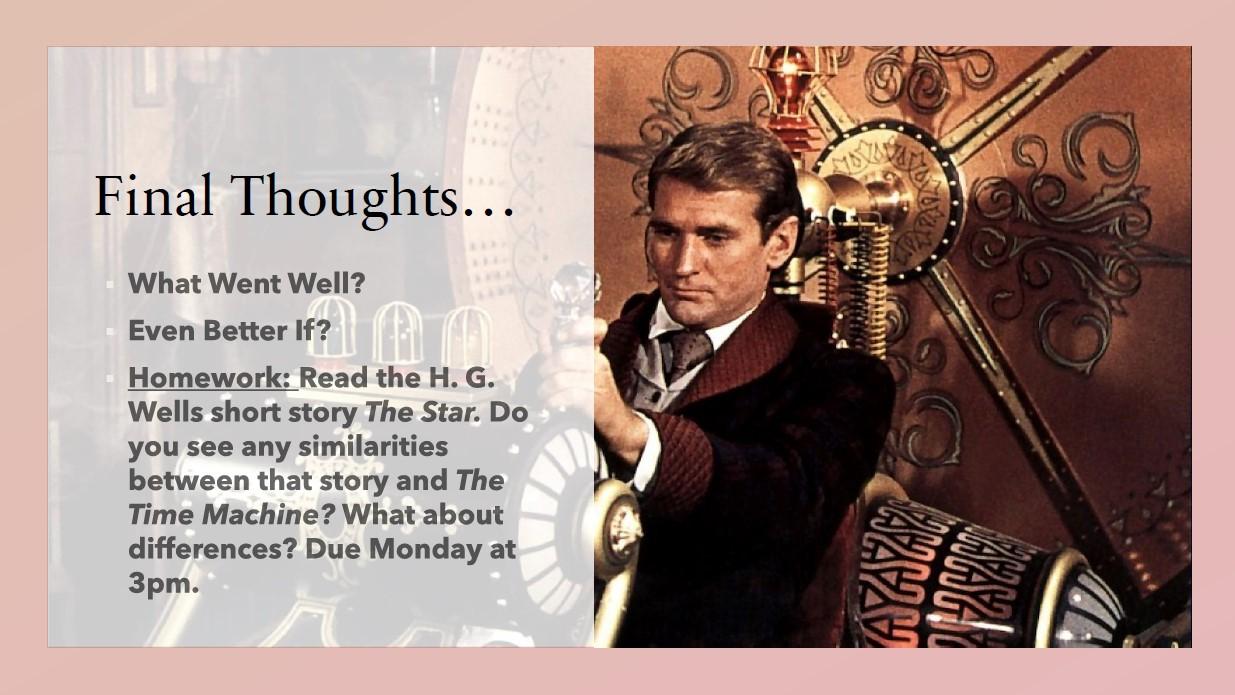
Attachments:
You must be logged in to view attached files. -
at 18:55 #26584
-
at 18:04 #26592
 𝐉𝐞𝐬𝐬𝐢𝐞Participant
𝐉𝐞𝐬𝐬𝐢𝐞ParticipantHi Beth,
Here is my homework. I’ve organised it into sections to show how both novels to a topic. So for example the tone, I wrote about the tone for both stories then showed how they were different. Hope it is clear!
All the best,
Jessie
-
at 18:06 #26593
 𝐉𝐞𝐬𝐬𝐢𝐞Participant
𝐉𝐞𝐬𝐬𝐢𝐞ParticipantPlot:
In the Time Machine, the time traveller uses his machine to visit many different eras, In the 802,701 A.D he discovers different communities (Eloi and Morlocks) with Eloi referring to the rich and wealthy in H.G Wells’ time and the Morlocks representing the poor. Then, when he loses his time machine, he explores the future of London and things are not what they seem.
In Star, the people of Earth find the news that an object (a star) is coming towards them, already disturbing the orbit of Neptune. Earthquakes, tidal waves, and the melting of the ice caps. Millions are killed, the star slightly misses the Earth and falls into the Sun.
These two novels are different with one going into time and the other based on astronomy.
The Main Message:
In The Time Machine, H.G Wells sends his main character-the Time Traveller- into the future to see how the world would end and from his descriptions,we can tell that everything is decaying and is getting itself into the hands of a dystopia. Through this, H.G Wells is trying to tell us that it’s still important to make choices and act so the Earth would be a better place for the coming generations and descendents.
In the book Star, it begins with astronomers observing a star approaching the solar system. They calculate it will pass close to the Earth – perhaps even crash into it. As the ‘star’ comes nearer, reaction ranges from awe to panic. Its gravitational pull causes earthquakes, tidal waves, and the melting of the ice caps. This shows that H.G Wells is saying that he thinks about how insignificant humanity is and its achievements are in the grand scheme of the universe.
Although in both stories the moral is different, Wells shows that were are not perfect and you make the right decisions and act to help the planet.
Tone:
In the science-fiction novel The Time Machine, the tone is straightforward. The story is a recount told by the Time Traveller through a dinner party, and he does not seem particularly awed by his own experiences. The tone is also earnest as the main character is hoping that his guests will believe his story.
In Wells’s book Star, he creates a tone of fright and awe in the crowds that stare at the incoming star as it approaches, then curiosity from the “people” watching from Mars.
In both stories, the tone differs- one is earnest and the other is awe turning into fright.
-
at 17:28 #26653
-
-
-
at 08:12 #26606
Alastair
ParticipantHi Beth,
Please find attached my homework.
Kind regards
Alastair
Attachments:
You must be logged in to view attached files.-
at 17:37 #26655
-
-
at 19:47 #26663
 YunshuParticipant
YunshuParticipantHi Beth,
Sorry! I accidentally uploaded the wrong piece of work! Here is the correct piece of work attached.
Attachments:
You must be logged in to view attached files.-
at 11:14 #26673
-
-
at 18:53 #26680
Beth
ParticipantSummary for Lesson 3
In today’s class we finished our work on The Time Machine, thinking about the core scientific principals at the heart of the book, such as evolution, and analysing Wells’ vision of the future. We began with a brief discussion of his short story The Star, discussing what it tells us about Wells’ approach to futurism and warnings for humanity. We then spoke about the symbolic significance of the Palace of Green Porcelain and the ‘sunset of mankind’ in the novel, linking this to Wells’ theories on evolution and devolution. We read an article that outlined these ideas and used an extract from the novel to help us identify Wells’ main points. Finally we had a brief debate on whether the novel is meant to make us hopeful for the future or not, which the class completed with great vigour and maturity. Fantastic and vibrant work today everyone, well done! See you next week! 🙂
Homework
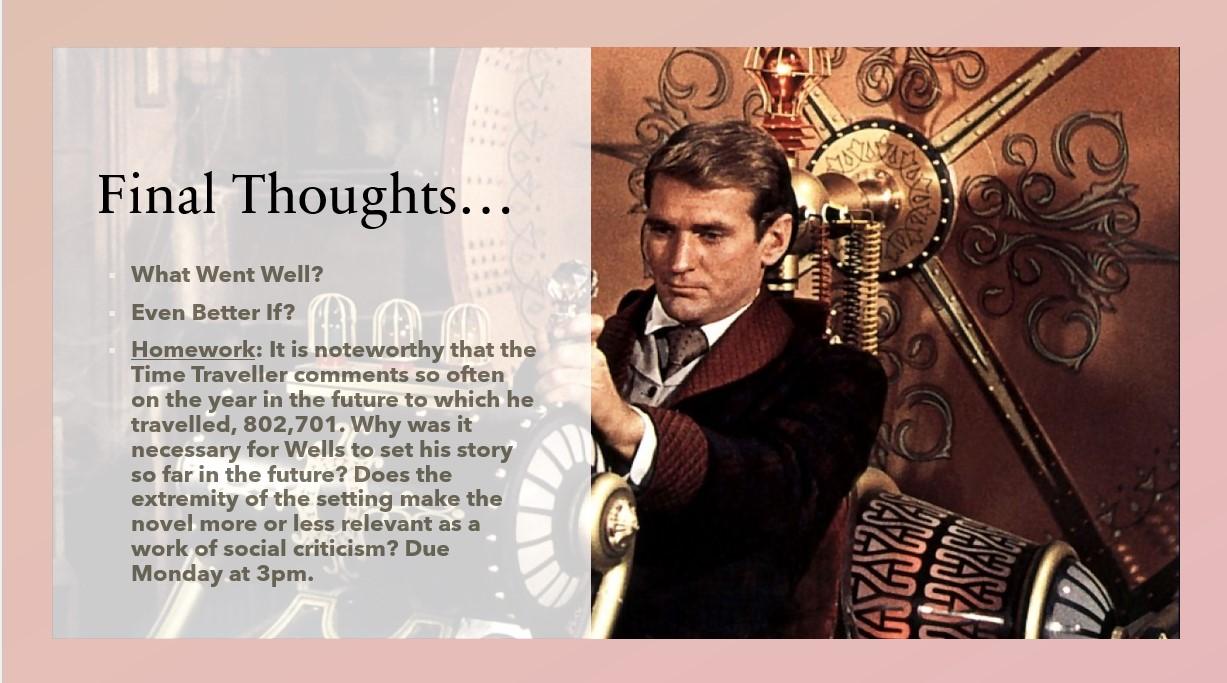
Attachments:
You must be logged in to view attached files. -
at 17:31 #26715
 EmiliParticipant
EmiliParticipant-
at 11:41 #26841
-
-
at 19:58 #26734
 𝐉𝐞𝐬𝐬𝐢𝐞Participant
𝐉𝐞𝐬𝐬𝐢𝐞ParticipantHi Beth,
Below is my completed homework. I can’t wait for our new book War Horse!
See you on Wednesday,
Jessie 🙂
-
at 19:59 #26735
 𝐉𝐞𝐬𝐬𝐢𝐞Participant
𝐉𝐞𝐬𝐬𝐢𝐞ParticipantI think it was necessary for Wells to set the story in the future. The Time Traveller (who gives the points of the author) wants to discover and understand things in the future which in the Victorian era wasn’t possible. For example, after the main character escapes from the Morlocks, he decides to travel into the future to see how the world ends. Then, after travelling millions of years from 802,701 AD he tries to find out about the earth’s fate. There, probably from the intense conditions or weathers implies he probably couldn’t get back to the present due to the severe conditions or weathers at the end of the world.
Due to this, throughout the book H.G Wells is trying to give us a warning, wanting us to take precautions in our everyday lives. He is saying that if us humans will carry on enslaving each other due to different classes will create a future of Eloi and Morlocks and the end of the world will be as treacherous as the ending of the story.
Overall, Wells is saying that it is not too late to change and is basically the ‘moral’ of the science-fiction novel. That is why he stretches the setting of the story to a much later future to show the consequences of the earth if we carry on like this.
-
at 11:49 #26843
-
-
-
at 09:40 #26736
Alastair
ParticipantHi Beth,
Please see attached my homework of the third week.
Kind regards
Alastair
Attachments:
You must be logged in to view attached files.-
at 12:00 #26845
-
-
at 19:18 #26852
Beth
ParticipantSummary for Lesson 4
In this week’s lesson we began with an introduction and overview of the central ideas and historical context of War Horse. We also looked at author intent (why did Morpurgo choose to write the novel like he did) and, combining these ideas with the central themes identified, thought about the meaning at the core of the novel. The powerpoint with all of the resources is attached below, which should be used to help plan and write the homework. The powerpoint contains our discussions of background of the novel, along with some historical facts and figures on the context of the First World War, and some comparative work involving a painting from 1914 of the battlefield. Well done for today’s lesson guys, I particularly enjoyed our conversation about wartime propaganda and why the historical context of literature is important. We also had a great discussion about how Morpurgo shows the horrors of war and you all shared excellent thematic and semantic fields! Amazing work and see you next week 🙂
Morpurgo interview: https://www.youtube.com/watch?v=aS3aVkz_uVw
Homework
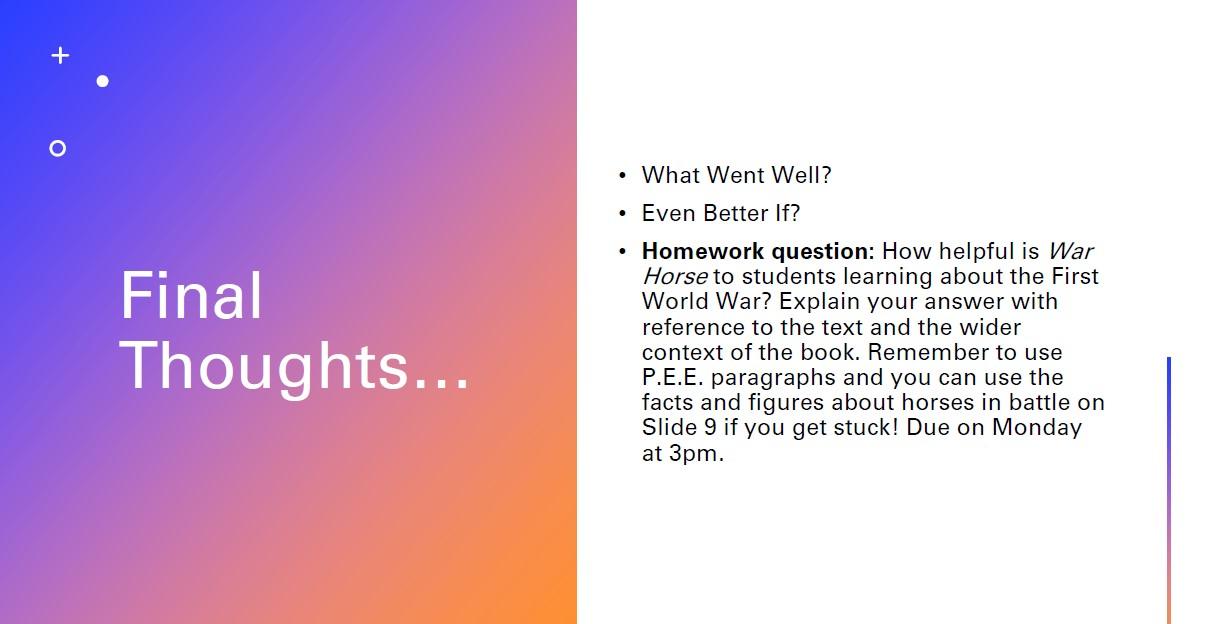
Attachments:
You must be logged in to view attached files. -
at 22:42 #26859
 YunshuParticipant
YunshuParticipantHi Beth,
Thank you for the wonderful and informative lesson on War Horse! I really enjoyed the lesson! 🎇😊
Please find my homework attached below. 🐴🐎
Thanks,
Yunshu
Attachments:
You must be logged in to view attached files.-
at 12:44 #27022
-
-
at 09:35 #26862
 EmiliParticipant
EmiliParticipant-
at 12:48 #27024
-
-
at 11:21 #26872
 𝐉𝐞𝐬𝐬𝐢𝐞Participant
𝐉𝐞𝐬𝐬𝐢𝐞ParticipantHi Beth,
below is my completed homework. I loved the lesson on War Horse!
See you on Wednesday,
Jessie 😀
-
at 11:22 #26873
 𝐉𝐞𝐬𝐬𝐢𝐞Participant
𝐉𝐞𝐬𝐬𝐢𝐞ParticipantPersonally, I think that Michael Morpurgo’s book -War Horse- is a helpful novel to students learning about World War 1. Not only is it an intriguing book, through a story it emphasises how much damage war causes and friendship which is ripped due to it. Throughout the book, many examples of friendship and affection are shown. The book covers mainly friendship and love during hard times like the war. Even in times of darkness, hope is still present as long as we do not let go of that hope. Happiness can still be created. Joey had strong bonds with Albert, Topthorn, Friedrich, Emilie and even the Germans, their opponents, provided for the young horse.
This is shown as War Horse shows how difficult times can tear apart families and companions like Albert and Joey. Joey had to be forced to fight in the war and leave their family, meaning it was worrying for Albert and his family as most soldiers never returned. War Horse also shows a realistic and factual side. This is because it states how horses are treated and used by both sides ( the British and the Germans). Joey is used by both sides, along with his companion Topthorn as they come to similarities- both sides use them for carrying and pulling supplies, ammunition, artillery and even the wounded. Animals like horses had to mean lower things to humans- they usually abandoned and left alone when danger was approaching. Only considerate soldiers place these animals equal to themselves, like Friedrich who attempts to pull Joey away from the bombing when they near Topthorn’s dead body. Friedrich dies when attempting and this shows both loyalty and faith. Michael Morpurgo shows how humans treat animals in war and comes to the fact, by using emotive language, that animal cruelty was a thing during WW1.
In general, touching bonds between animals and humans show the message of kindness and care for one another, the real but brutal works for forced cavalry horses, young and old, in the army. Overall, War Horse is very helpful to students studying about World War One and it shows the power of friendship, love and kindness (the positive side) but also the factual side as well.
-
at 13:07 #27026
-
-
-
at 21:19 #26919
Alastair
ParticipantHi Beth,
Attached is my homework of Week 4.
Thanks for the wonderful lessons. Really appreciated.
Kind regards
Alastair
Attachments:
You must be logged in to view attached files.-
at 13:19 #27028
-
-
at 18:05 #26984
leyan
ParticipantHi Beth,
Here is my homework below. Thanks for the wonderful lesson
Leyan
-
at 18:06 #26985
leyan
ParticipantWar horse is a great book to teach students studying WW1 as it adapts from a real story, the person he met at the pub. It teaches the students how they used less machinery in World War 1 and focused more on cavalry.
During the First World War (1914-18), horses were needed to perform cavalry roles but were also vital for moving supplies, equipment, guns and ammunition. Therefore, the requisition, transportation and care of these animals were of enormous importance. This is mentioned in a wide range throughout the book, caring for the animals and cavalry roles was crucial for the British survival.The book emphasises how friendships are broken because of a devastating war, and how the bond of love and affection to each other is taken away. . Michael Morpurgo shows how humans treat animals in war, but especially in times of danger. In wars, animals like horses have to be a lower class to humans- they could be given up on or deserted in the bombing and shelling, but some considerate humans place these animals equal to themselves.
All in all, War Horse is a brilliant story of war. The touching bonds of humans and animals drifted apart in their lives. This is a depiction of everything as Micheal Morpurgo has talked to a real WW1 soldier. The book is an accurate source for finding everything about the First World War, such as the terrible working conditions of soldiers and the cruelty of animals, which are crucial to British survival. “Of 136,000 Australian horses shipped off to war, only one-Sandy- returned home.” this quote from the British War Museum shows how many horses died going to battle and how devastating to fight in a war.
-
at 21:48 #27008
Adrian
ParticipantDear Beth
Here is my homework.
Thank you
Adrian
Attachments:
You must be logged in to view attached files.-
at 13:53 #27032
-
-
at 21:48 #27009
Adrian
ParticipantDear Beth
Here is my homework.
Thank you
Adrian
Attachments:
You must be logged in to view attached files.-
at 16:01 #27207
-
-
at 19:13 #27036
Beth
ParticipantSummary for Lesson 5
In this week’s lesson we dug deeper into War Horse, considering in particular the style and narrative voice of the novel. The powerpoint with all of the resources is attached below, which should be used to help plan and write the paragraphs assigned for homework. The powerpoint contains our discussions of the effect of the style of narration on how the book is told along with some textual analysis of literary techniques and how to identify them and some guidelines for writing P.E.E. paragraphs about the themes in Joey’s narration. This lesson was very debate centred and everyone did very well, offering lots of interesting and well-thought through contributions on the nature of war and how a first-person perspective told through the narrative voice of a horse amplifies Morpurgo’s message. I was very impressed by everyone’s work thinking about the different narrative voices that could be utilised within the book, and their writing was excellent! Fab work everyone- well done and see you next week! 🙂
Homework
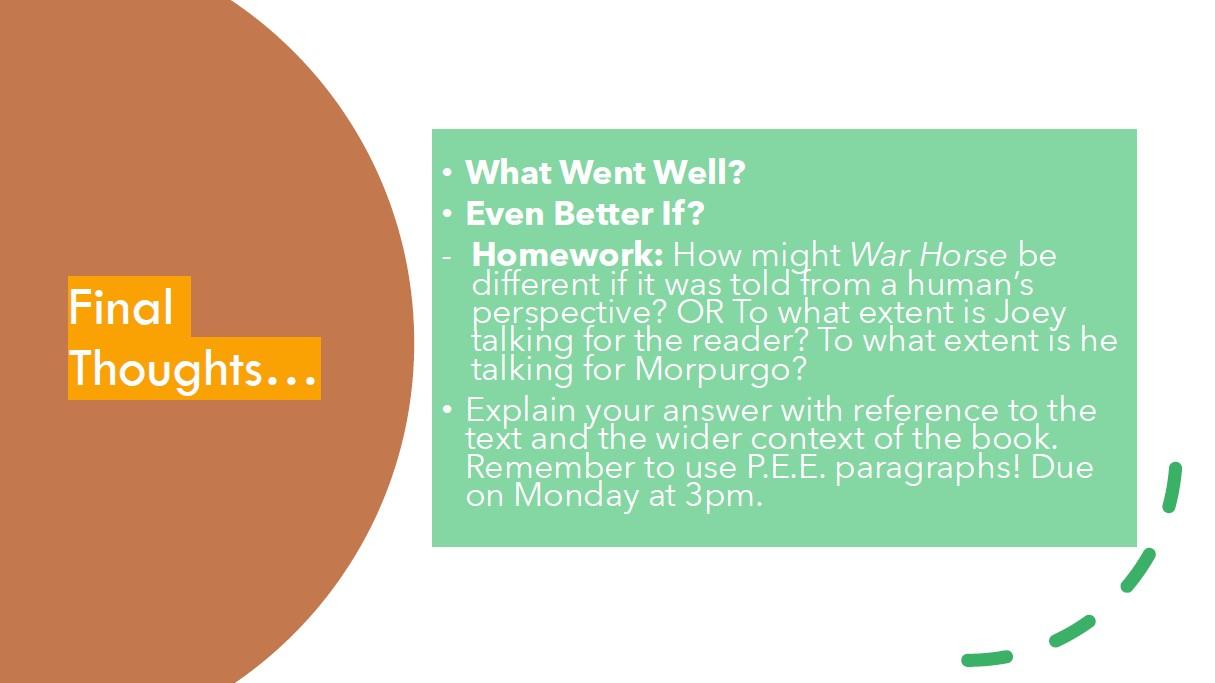
Attachments:
You must be logged in to view attached files. -
at 20:16 #27064
 𝐉𝐞𝐬𝐬𝐢𝐞Participant
𝐉𝐞𝐬𝐬𝐢𝐞ParticipantHi Beth,
Thank you for the wonderful lesson exploring the narrative and its style. Below is my completed PEE paragraph.
See next lesson,
Jessie
-
at 20:18 #27065
 𝐉𝐞𝐬𝐬𝐢𝐞Participant
𝐉𝐞𝐬𝐬𝐢𝐞ParticipantI think that if War Horse was written from a human’s perspective then the novel would contrast to writing it through an animal’s view. They have different thoughts unlike us -humans- who see the war as a brutal and horrific disruption, they look upon the noble and the kind who are loyal.
This is because Joey doesn’t act like humans do. While the men often talk about the dangers and brutal things about the war and all the horrors, Joey just goes with the others and on the flow he is carried on to. There are times when he mentions the excruciating pains on his ankles he doesn’t complain or worry about it. He just knows everything is fine unlike the men who know their life will be over. Mostly, Joey’s love for his friends is shown when Topthorn dies. Joey stays with him all day and night. “a powerful sense of sadness and love that compelled me to stay with Topthorn for as long as I could” (pg.118). This shows that Joey loves and cares for Topthorn as he risks his own life to stay with his companion whom he stayed with for a long time.
Animals (like Joey) don’t know the difference between different traits- the German and a British. They can only separate kind people from cruel people. This is why the book describes the bewilderment and confusion at battle which probably other horses felt after being suspended. Joey, who used to work on a farm, feels different conditions and so would the others. This is shown as in various parts in the novel, they don’t understand what is going on but instead then shows their love and passion for one another.
-
at 17:18 #27209
-
-
-
at 16:41 #27082
 EmiliParticipant
EmiliParticipant-
at 17:21 #27211
-
-
at 22:45 #27107
Alastair
ParticipantHi Beth,
Please see attached my homework of Week 5.
Kind regards
Alastair
Attachments:
You must be logged in to view attached files.-
at 17:27 #27215
-
-
at 19:17 #27187
leyan
ParticipantDear Beth, thank you for the lesson
My homework is belowꜜ
Kind regards,
Leyan
-
at 19:18 #27188
leyan
ParticipantIf War Horse were written and told from a human’s perspective, nearly everything would change. Firstly, it would not focus on the importance of horses and calvary, instead, it would be a bit like a soldier’s diary, recalling the soldier’s battle. The book would not describe vividly how the horses reacted and how the horses’ backgrounds could be. Like Joey, most of the horses could be taken from a peaceful and tranquil countryside farm and expected to fight for the country.
Joey describes things differently than humans. Joey describes things with exaggeration, as horses are more frightened than humans, implying from page 65 ‘and horses reared and screamed in an agony of fear and pain.’ We can infer from the ‘and’ that he puts emphasises how devastating his first sights of war were.
If this were written from a human’s perspective, the man who is talking already knows his life is over, however, Joey always thinks he is fine, which gives up hope that he will still be alive.
-
at 17:35 #27217
-
-
at 20:01 #27192
leyan
ParticipantDear Beth, this is my homework for lesson 1 of War horse below ⬇️
Kind regards,
Leyan.
-
at 20:39 #27196
leyan
ParticipantWar horse is a brilliant book for students, ranging from a variety of topics. It talks about the friendship between humans and horses, being slowly drifted away. Additionally, it is interesting as it uses the perspective of a horse, allowing students to get an almost more interactive experience whilst reading.
Firstly, it discusses the use of horses and how vital their contribution to the war was, carrying ammunition, supplies and the dead. Also, another use was of horse was for militray and travelling. This could educate the students and provide them with information about the use and the conditions of a ‘war horse’.
Secondly, it could teach students about the conditions of the soldiers. If it were in the perspective of he man there would obviously be prejudices, whereas a horse has a less sense of morality, therefore would be neutral on the subject. Morpurgo Cleverly writes this in a very convincing way, allowing the students to get a view of both sides. This is shown by an analogy between a british and german soldier flip a coin to see who gets to keep Joey, without showing any signs of violence and come to an agreement. This also shows signs of not every one was biased and had only the motive to kill, but had the insentive only because they were forced to.
In conclusion, I personally think that War Horse is a great book for students as it discusses about the horrors of the war, yet how a single horse changed the morale and the way the book was revolving around, not just a war, but the friendships and hardships within the war. therefore, not only does the book teach students history, but its main plot, was to teach them that through hardships, anything as simple as a horse can get them through it.
-
at 17:44 #27219
-
-
at 19:18 #27221
Beth
ParticipantSummary of Lesson 6
In this final lesson on War Horse, we delved a bit deeper into close textual analysis and how to write about word choice and literary techniques in a literary context. The powerpoint with all of the resources is attached below, which should be used to help plan and write the mini-essays assigned for homework. The powerpoint contains our discussions of essay structure, guidelines for writing P.E.E. paragraphs on analysing quotations, and lots of important information in terms of what to include in the homework essays. We had a particularly good discussion about the concept of word choice, thinking about how to understand books as constructions and analyse the author’s language choices in that vein. Today’s lesson was really content-heavy with loads of ideas, debates and exercises packed into the hour and everyone fantastically on all counts. Really well done everyone, remember to practice using the P.E.E. structure to analyse literary techniques and word choice, and excellent work on your discussion at the end of class about what you have learnt from the novel. See you next week! 🙂
Homework
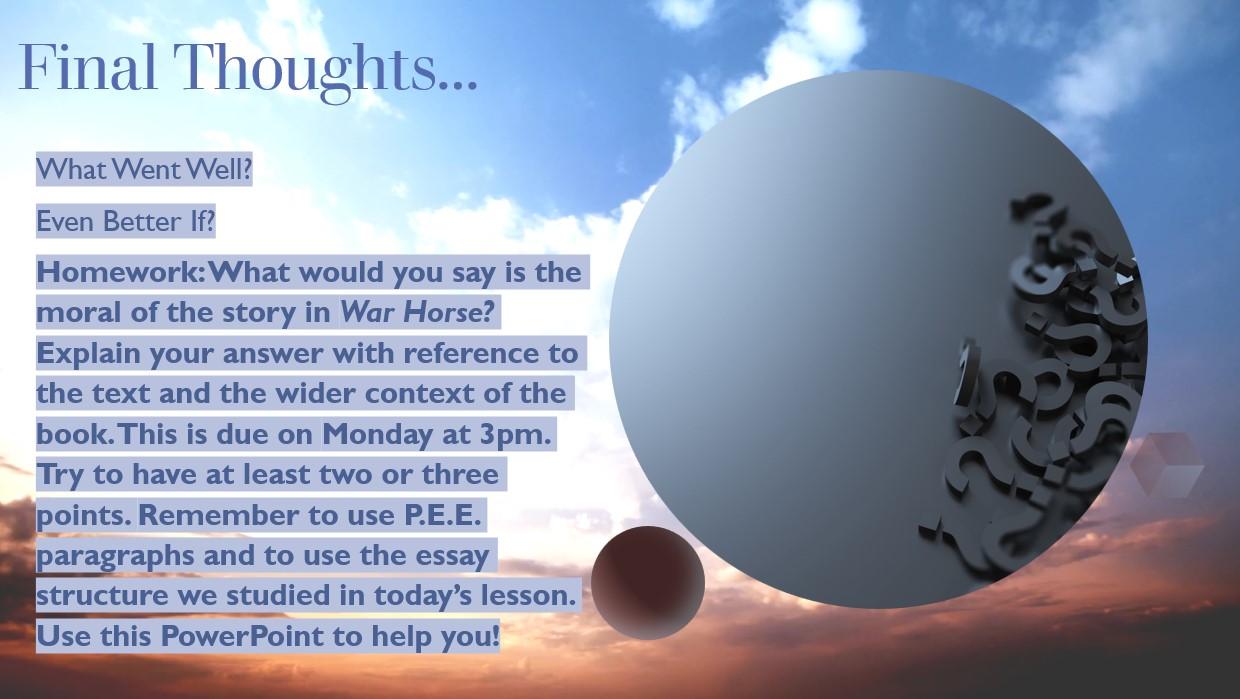
Attachments:
You must be logged in to view attached files. -
at 21:01 #27235
-
at 12:57 #27260
 EmiliParticipant
EmiliParticipantHi Beth,
I’ve changed my homework a bit,
thanks
Emily P
Attachments:
You must be logged in to view attached files.-
at 09:49 #27330
-
-
at 20:03 #27264
 𝐉𝐞𝐬𝐬𝐢𝐞Participant
𝐉𝐞𝐬𝐬𝐢𝐞ParticipantHi Beth,
Below is the homework I have completed.
Thank you,
Jessie
-
at 20:06 #27265
 𝐉𝐞𝐬𝐬𝐢𝐞Participant
𝐉𝐞𝐬𝐬𝐢𝐞ParticipantI think the moral of Michael Morpugo’s novel War Horse is that though life can be quite hard to get through, like the horrors of war, encouragement and kindness from everyone can make a big difference.
This is shown as Joey shows remarkable compassion when Topthorn is ill, doing all he can to comfort him. He nuzzles him and licking him to try to keep him warm and to reassure him that he was not alone in his pain” (12.11) Furthermore, Friedrich attempts to pull Joey away from the bombing when they near Topthorn’s dead body. Friedrich dies when attempting and this shows both loyalty and faith.
This explains that the touching bonds between animals and humans show the message of kindness and care for one another through all the brutal works for forced cavalry horses, young and old, in the army.
Secondly, Joey’s experiences are hostile by calming at times. His relationships between the British army and the German army are similar and they treat him nicely as an important member. Only because the Germans were enemies to the English doesn’t always means they have cold hearts.
This is shown as when he was stuck in No Man’s Land in the lines of wires, soldiers from the opposing sides kind of work together to free him then use a coin to see which side owns him.
This means that both sides are very similar towards their opponents whom they are not intending to kill. Only because they are from different nationalities, they are counted as enemies but that doesn’t mean that only if they have a different language they can’t help.
This shows my thought that the moral of War Horse is the care and kindness which is shown. It is comforting
-
at 10:09 #27332
-
-
-
at 22:45 #27268
Alastair
ParticipantHi Beth,
Please find attached my completed assignment for Week Six.
Kind regards
Alastair
Attachments:
You must be logged in to view attached files.-
at 10:16 #27334
-
-
at 19:13 #27340
Beth
ParticipantSummary for Lesson 7
In today’s lesson we began studying A Christmas Carol by Charles Dickens. The powerpoint with all of the resources is attached below, which should be used to help plan and write the paragraphs assigned for homework. The powerpoint contains loads of information on the context of A Christmas Carol, thinking about how the backdrop of Victorian England influences the themes in the book, and considering what modern parallels can be drawn between society in the 1800s and society today. We had a great discussion on everyone’s favourite and least favourite parts of the book, and the class did some wonderful work thinking about how the history behind a book can influence our thinking about it. Everyone worked excellently in today’s lesson, I was particularly impressed and moved by the maturity and thoughtfulness which the class lent to issues of poverty and inequality in not only Victorian England but also our own world today. They came up with some fantastic contextual analyses of the novel and thought about how the life of the author informs our knowledge too. Well done class- super impressive work today! 🙂
Video on 1800s London: https://www.youtube.com/watch?v=lJbTWDNYIck
Video on Dickens: https://www.youtube.com/watch?v=5czA_L_eOp4
Homework
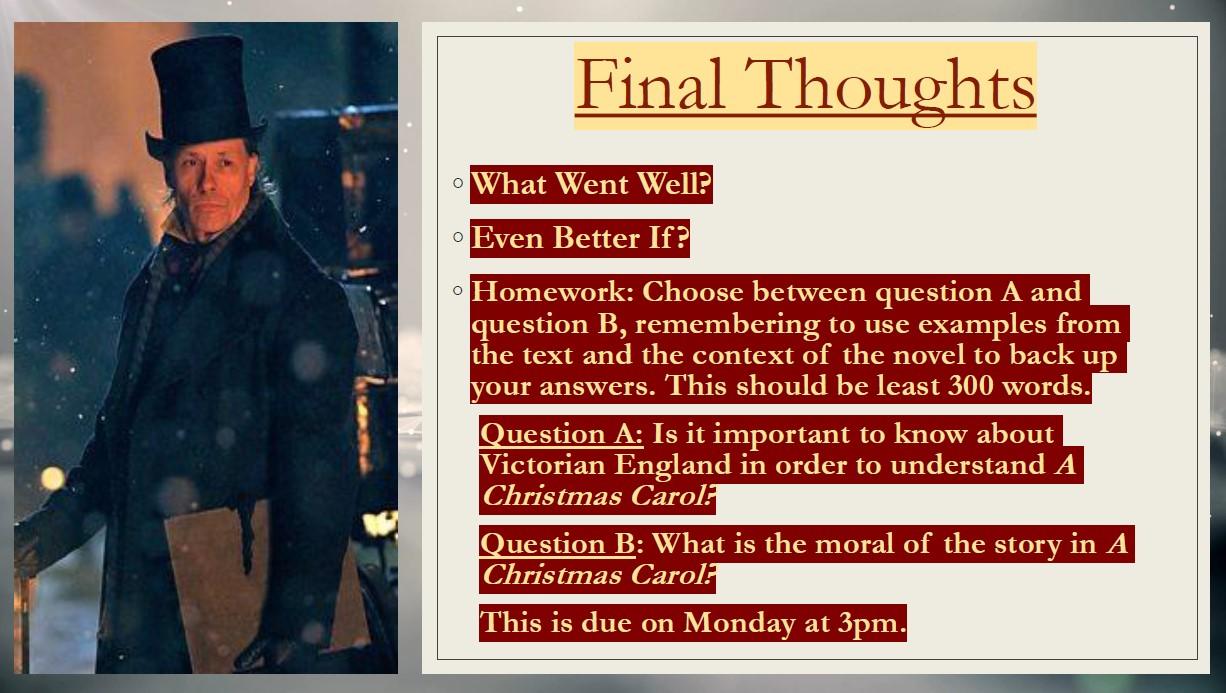
Attachments:
You must be logged in to view attached files. -
at 19:02 #27358
 EmiliParticipant
EmiliParticipant-
at 11:07 #27448
-
-
at 08:05 #27380
Alastair
ParticipantHi Beth,
I attached my homework assignment for Week Seven.
Kind regards
Aaron
Attachments:
You must be logged in to view attached files.-
at 11:20 #27450
-
-
at 08:49 #27428
 𝐉𝐞𝐬𝐬𝐢𝐞Participant
𝐉𝐞𝐬𝐬𝐢𝐞ParticipantWhat is the moral of the story in A Christmas Carol?
After reading Charles Dickens’ novel A Christmas Carol, many themes and messages swim in my head. Personally, I think the moral is that money can not be put in front of family and friends. Wealth doesn’t bring happiness nor does it bring kindness and hope. Here are my reasons why.
The line ‘My clerk, with fifteen shillings a week, and a wife and a family, talking about a merry Christmas. I’ll retire to Bedlam’ demonstrates that Scrooge can’t understand how someone can have positive emotions. He only thinks on the negative side and links everything together with wealth. Furthermore, although Scrooge has money, he is always feeling dismal. Living alone, his own depression and lack of human companionship takes over him as well as his work.Opposing very greatly from Ebenezer Scrooge, though the Cratchits are poor, they are merry. The Cratchits are not wealthy but they are prosperous in spirit, love and affection for one another. Lastly, Scrooge’s nephew is an ordinary, average man. He was poor but lived a comfortable life whereas Scrooge was rich and corrupt. “Though it has never put a scrap of gold in my pocket, I believe it has done me good”, shows that Fred enjoys Christmas even though there was no profit. Scrooge ,of course, called it a humbug alongside the fact it makes people happy.
This shows that Scrooge, a “squeezing, wenching, grasping, scraping, clutching, covetous old sinner” , was taken over by greed. Overall, money is nothing really important and definitely does not deserve to get placed above friends and relatives.
-
at 11:39 #27452
-
-
at 19:10 #27458
Beth
ParticipantSummary for Lesson 8
In today’s lesson we continued our study of A Christmas Carol by Charles Dickens, this time delving deeper into the core of the book itself to think about themes. The powerpoint with all of the resources is attached below, which should be used to help plan and write the paragraphs assigned for homework. The powerpoint contains lots of ideas on the themes in the novel which the students had identified, analysis of that thematic material, thinking about how to fit this into Point, Evidence, Explain essay paragraphs, and information on the genre of a morality drama and the dramatic convention of character arcs. We also had an amazing discussion at the beginning of the lesson recapping on last week’s ideas of context and relevance in the modern world, and the students engaged in an excellent in-depth analysis of the theme of ghosts in the novel, linking this theme to others such as religion and coming up with many different interpretations and ideas for what the ghosts in A Christmas Carol could communicate or symbolise. Really thoughtful and intelligent work from the class today- every single person engaged in some fantastic debate and came up with some really sophisticated and fascinating ideas. I was very impressed by their work! Well done class, keep up the amazing job you’re doing and see you next week 🙂
Homework
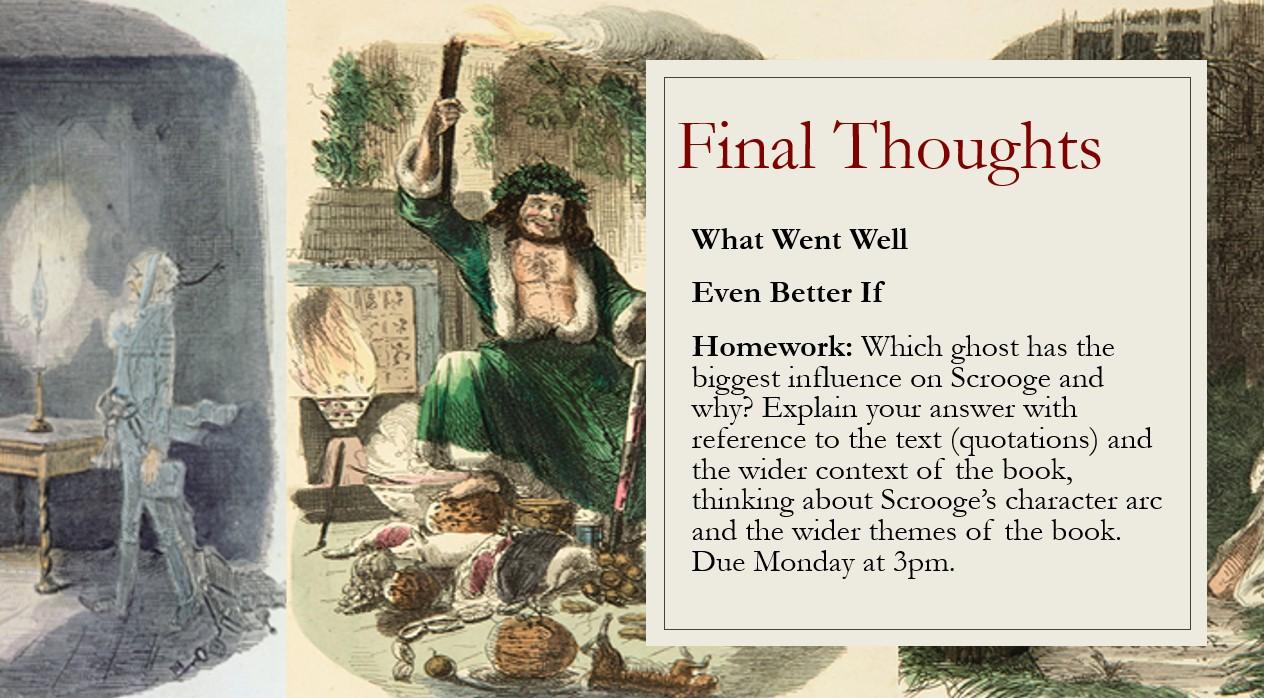
Attachments:
You must be logged in to view attached files. -
at 20:41 #27472
 EmiliParticipant
EmiliParticipant-
at 11:20 #27575
Beth
ParticipantHi Emily,
Lovely work this week, I’ve attached your feedback below. See you soon 🙂Attachments:
You must be logged in to view attached files.-
at 19:53 #27590
Beth
ParticipantHi Emily,
I’ve just realised that you’ve been posting your work in the wrong forum, as this is the Wednesday forum and you’re in the Monday class which is a week behind this one- sorry for not spotting that sooner and for marking your work as late when it wasn’t at all, was just in the wrong place!
I’ll put the link to the Monday forum below so you know where to put your work from now on 🙂
-
-
-
at 20:37 #27503
 𝐉𝐞𝐬𝐬𝐢𝐞Participant
𝐉𝐞𝐬𝐬𝐢𝐞ParticipantHi Beth,
Here is my homework. Thank you for the lesson, can’t wait for the next!
Thank you,
Jessie
-
at 20:37 #27504
 𝐉𝐞𝐬𝐬𝐢𝐞Participant
𝐉𝐞𝐬𝐬𝐢𝐞ParticipantImpact, a word that is powerful, is a word that could be defined as having a strong effect on someone. In A Christmas Carol, Scrooge was greatly impacted by the Ghost of Christmas present who came to visit him, infact the Ghost of the Present gave the most impact on Scrooge than any of the rest.
This is shown as the ghost of the present uses Scrooge’s own words against himself to make the hard-hearted man of himself think about what he has done and said before. For example, the phantom says “ ’What then? If he would like to die, he had better do it, and decrease the surplus population.’ Scrooge hung his head to his own words”. The ghost quotes this from Scrooge after he shows the miserable man that poor, innocent tiny Tim will soon perish. Earlier he said the poor should die if they can’t help themselves. The ghost does this to make Scrooge think about how he should change. Scrooge feels guilty about ignoring the poor and regrets saying that the poor should die.
Not only that, the Ghost of the Present is dressed like Father Christmas, “clothed in one simple green robe, or mantle, bordered with white fur.” In the Victorian Era, Father Christmas wore green robes. This also highlights that the ghost represents generosity and kindness which is definitely the personality of the third phantom.
This means that the Ghost of the Christmas Present has the most impact. In the novella, the spirit taught heartless, inconsiderate Scrooge to love and be kind to one another and the real meaning of importance.
-
at 11:32 #27577
-
-
-
at 08:52 #27519
Alastair
ParticipantHi Beth,
Please find attached my writing assignment for Week 8.
Kind regards
Alastair
Attachments:
You must be logged in to view attached files.-
at 11:48 #27579
-
-
at 19:18 #27588
Beth
ParticipantSummary for Lesson 9
In today’s lesson we completed our study of A Christmas Carol by Charles Dickens, finishing up with a lesson on close textual analysis using several interesting passages from the text to do so. The powerpoint with all of the resources is attached below, which should be used to help write the exam questions assigned for homework. The powerpoint contains lots of ideas on how to use literary analysis in a creative and compelling way, focusing on concepts of word choice, literary techniques, structure and thinking about author intent. It also includes a mark scheme for close textual analysis P.E.E. paragraphs completed in the lesson, and some thoughts on how to self-evaluate. We had a really good debate about how to both create and analyse atmosphere through the use of literary techniques & I was particularly impressed with the class’s imaginative ideas for what would have happened to Scrooge if he hadn’t changed by the end which were great fun to hear- well done for this everyone! Fantastic work as ever- see you next week! 🙂
Homework
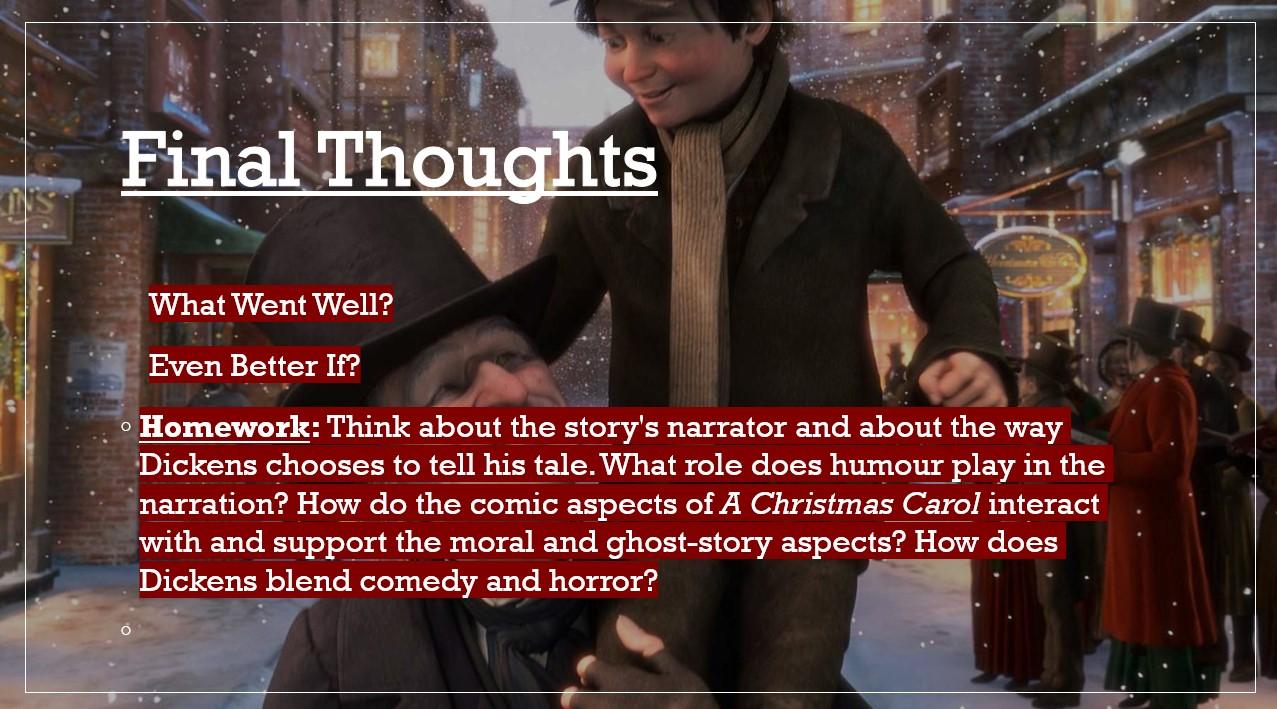
Attachments:
You must be logged in to view attached files. -
at 12:38 #27598
 EmiliParticipant
EmiliParticipant-
at 13:08 #27734
-
-
at 16:22 #27630
 𝐉𝐞𝐬𝐬𝐢𝐞Participant
𝐉𝐞𝐬𝐬𝐢𝐞ParticipantDear Beth,
Below is my homework.
Thank you,
Jessie
-
at 16:22 #27631
 𝐉𝐞𝐬𝐬𝐢𝐞Participant
𝐉𝐞𝐬𝐬𝐢𝐞ParticipantIn Dickens’ novella, A Christmas Carol, it is evident that humour (very dark humour indeed) is involved. As the lonely miser has various remarks which are humorous, this is only created because the protagonist has a selfish, self-seeking heart. Then, you may ask, what role does humour play in the narration? Humour plays an important role in mocking Scrooge, especially when The Ghost of Christmas Present quotes these phrases to make Scrooge seem ashamed of himself.
This is shown throughout the book starting from the first stave. Consider this phrase: Are there no prisons?” asked Scrooge.
“Plenty of prisons,” said the gentleman, laying down the pen again.
“And the Union workhouses?” demanded Scrooge. “Are they still in operation?”
“They are. Still,” returned the gentleman, “I wish I could say they were not.”
“The Treadmill and the Poor Law are in full vigour, then?” said Scrooge.
“Both very busy, sir.”
“Oh! I was afraid, from what you said at first, that something had occurred to stop them in their useful course,” said Scrooge. “I’m very glad to hear it.”
Then, when the second spirit visits, he quotes the name thing, causing Scrooge to stare in fearful realisation when he asks ‘if Tiny Tim will live.’ “Are there no prisons?” said the Spirit, turning on him for the last time with his own words. “Are there no workhouses?”
This shows that Scrooge is using rhetorical questioning to get at his dark joke that prisons and workhouses are charity enough for the poor, the comedy is how is Ghost of the Present fights back with Scrooge, getting the better of him as he uses Scrooges own word to back himself up.
-
at 13:16 #27737
-
-
-
at 08:43 #27665
Alastair
ParticipantDear Beth,
I attached my writing assignment for Week 9.
Kind regards
Alastair
Attachments:
You must be logged in to view attached files.-
at 15:16 #27743
-
-
at 19:13 #27750
Beth
ParticipantSummary for Lesson 10
In today’s class we began our work on Northern Lights, our final book of the winter course. We worked today on the background of the book, considering Philip Pullman, the author, and his motivations in writing this novel. We touched on genre, thinking about magical realism, fantasy and adventure, and spoke about the process of worldbuilding. The students then connected this idea to the world within the novel, questioning the rules and structures of Pullman’s world and thinking about how he shows this to the reader. We spoke about the similarities and differences between our world and the one of the novel before discussing some tips for worldbuilding and thinking about how to use Pullman as inspiration. Excellent and creative work today everyone- well done and I’ll see you next week! 🙂
Video on worldbuilding: https://www.youtube.com/watch?v=cZcIT603zpI
Homework
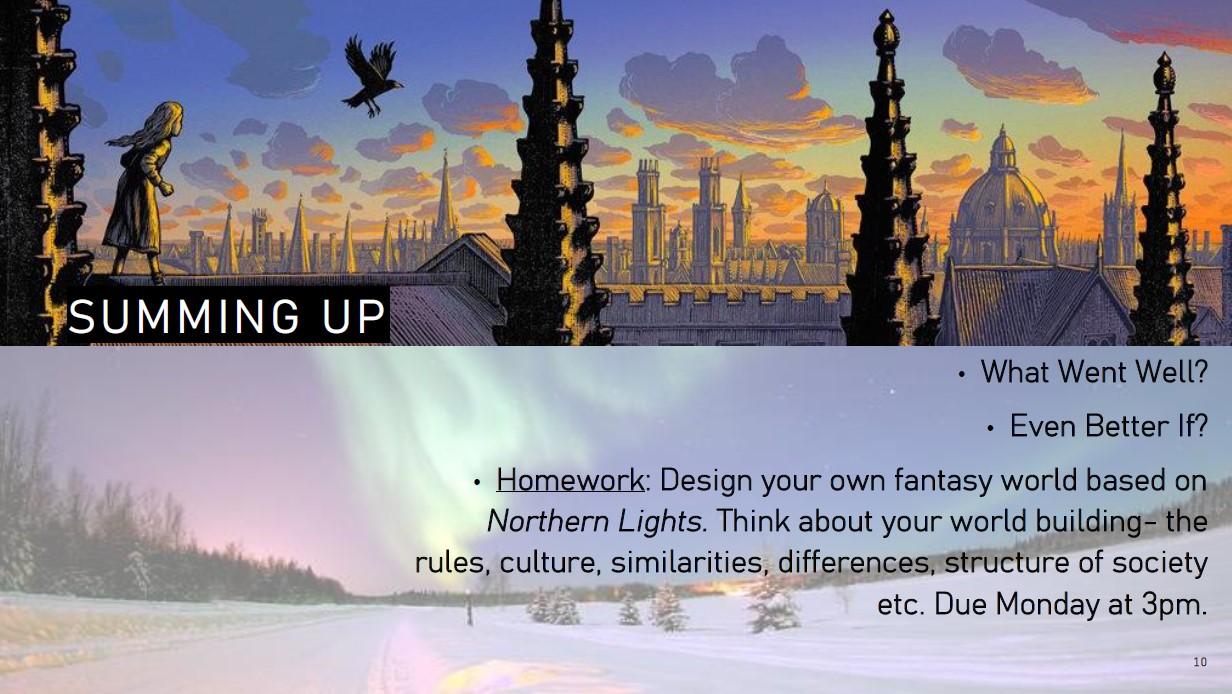
Attachments:
You must be logged in to view attached files. -
at 16:58 #27764
 YunshuParticipant
YunshuParticipantIn the parallel world from ours, in a parallel universe, is the planet of Gaia. Gaians (the citizens of Gaia) are similar to you or me, but instead of brown, hazel, or blue eyes, all the Gaians have glowing silver eyes and golden threads of splendid hair. The Gaian women wear clean, comfortable, billowing white dresses and platinum jewelry decked with diamonds, whilst the men wore the same type of clothing as the women but it was a tunic and went down to their knees instead of their ankles.
Their world is similar to ours, in an aspect, but a more beautiful world. In their world, there are shiny bronze leaves on the silver branches of delicate trees, and the fruit that comes from plants there would make the sweetest wild strawberry in our world taste sour. After one from our world has eaten any of their food, all the good foods that one has liked in this world would taste like medicine. The sky in Gaia is clearer and bluer and would make the sky on Earth seem grey. Clouds, puffy and angelic white float above the sky of Gaia, and a gleaming sun shines down most days on that beautiful world, over grassy green meadows and gentle slopes, sapphire seas, and rocky mountains. There seems to be no pollution in that world and the air is crisp and clear, unlike the air of London, which is sooty and clogs the lungs of citizens. When it does rain, it rains sweet and fresh water, like that of mountain springs, and feels soft and soothing.
Everyday life in that world is similar to ours and the people speak the languages we speak, for we are related to them somehow. However, there is a touch of magic in that world. Animals can speak and communicate with people and live alongside them, like neighbors, and are treated as equals. Animals work, live and interact with people all the time. The Gaians also have a spiritual object connected to their soul, which helps balance their inner energy and brings them into a deep, heavy with no dreams, when they die. From this sleep they cannot be woken. The spiritual object is carried in a silk purse by the Gaians and is always with them. The object can be a necklace, ring, earring, jewel, or piece of razzle-dazzle silk. All these objects are unique to a Gaian and they choose their object when they are born, by looking at and touching the one that they associate towards. If the object is lost or destroyed, the Gaian will be disconnected from their spirit and die, but not enter a peaceful sleep but be doomed to wander the world, invisible and unheard of, without rest or calm, until they find their object or fix it or if they do not, they are doomed to do this forever. It is an offense for Gaians to touch each other’s objects and a Gaian that does this will cause pain and unrest in another Gaian.
Everything else in the land of Gaia is identical to ours, such as money and culture or species of animals and food.
-
at 14:57 #27875
-
-
at 19:33 #27767
Adrian
Participant-
at 15:00 #27877
-
-
at 16:50 #27789
 𝐉𝐞𝐬𝐬𝐢𝐞Participant
𝐉𝐞𝐬𝐬𝐢𝐞ParticipantDear Beth,
Here is my homework, can’t wait for next week.
Thank you for everything,
Jessie
-
at 16:50 #27790
 𝐉𝐞𝐬𝐬𝐢𝐞Participant
𝐉𝐞𝐬𝐬𝐢𝐞ParticipantThe sun broke over the pale white sky, its light (a shade of fluorescent green) dancing on every golden leaf and vine, keeping the world in comfortable heat and glamour. Birds whispering ,instead of chirping, to each other. The sunset in the sky were splashes of irreplaceable colours filling an artist’s canvas. I thought, “This is heaven. This is perfect.”
Then I heard the snuffling of a bear nearby. Its fur was a shade of hazel acorns and its eyes were both black and bright. With the bear breathing hard behind him, I jumped into the hole, hoping it was wide enough and deep enough to protect him.
“I can see you,” a pleasing voice stated. I turned. It was a girl, who had probably spied on me as I arrived into this lost city in the skies with my dog Paddy.
Swaying in the mid air, her silver, silky metallic hair -tucked behind her pointy, elf-like ears- were sapphires glistening in the moonlight. Draping around her slender body, her velvet, violet royal robes are her only protection and fashion icon. Dangling like nocturnal bats, her peculiar strands of golden laces run down her cloak. Chained around her neck was a recognizable crystal shaped necklace.
After seeing me gap at it, the girl then smoothly said, “This heart-shaped pendant is actually the main essence of immortality and the most important attribute for any immortal.”
Immortal? I couldn’t believe my eyes. I had only heard about them in stories but glimpsing at one now is really out-of-the-box. Then another squeaky voice exclaimed, “What is that thing next to the girl?” It was a chimpanzee perched on the girl’s shoulder, and as if he read my mind, shortly spat, “Daemon, an animal companion, that can talk and think the same as you. No one is allowed to touch another’s daemon, that causes pain and offence. Anyway, come with me to my house.”
The road was made of a soft substance of flower petals, a sensation to the feet. Houses that hunched on both sides possessed beautiful facades and was at least three-storied. It seemed like a fairy tale. The warm gust blowing swept onto my face, causing a tingling surprise. I though, “This city really is magical.”
-
at 15:07 #27879
-
-
-
at 10:30 #27799
Alastair
ParticipantDear Beth,
I attached my writing assignment for Week 10.
Kind regards
Alastair
Attachments:
You must be logged in to view attached files.-
at 16:32 #27881
-
-
at 19:46 #27937
Beth
ParticipantSummary for Lesson 11
In today’s class we continued our work on Northern Lights, thinking today about the concept of power in the novel. We began with reading a BBC article arguing that this book is particularly relevant in the modern day before discussing the notion of power and corruption in the novel. The class discussed the concept of hierarchy with great maturity and came up with some fantastic examples of how this relates to the book. We then moved on to thinking about Milton’s Paradise Lost and how it relates to the novel, focusing on the concept of rooting for the devil that Milton and Pullman were both inspired by. The class analysed Pullman’s use of Paradise Lost and came up with some great ideas of how he presents villany in the story. Finally, we spoke about daemons and the class each designed their own, thinking about the role they play in the story. Truely outstanding work today class- you all contributed excellent ideas throughout and dealt with incredibly complex concepts amazingly. Super impressive today everyone- you should all be very proud of yourselves! See you soon 🙂
BBC article: https://www.bbc.com/culture/article/20191025-why-his-dark-materials-is-the-fantasy-epic-for-our-times
Homework
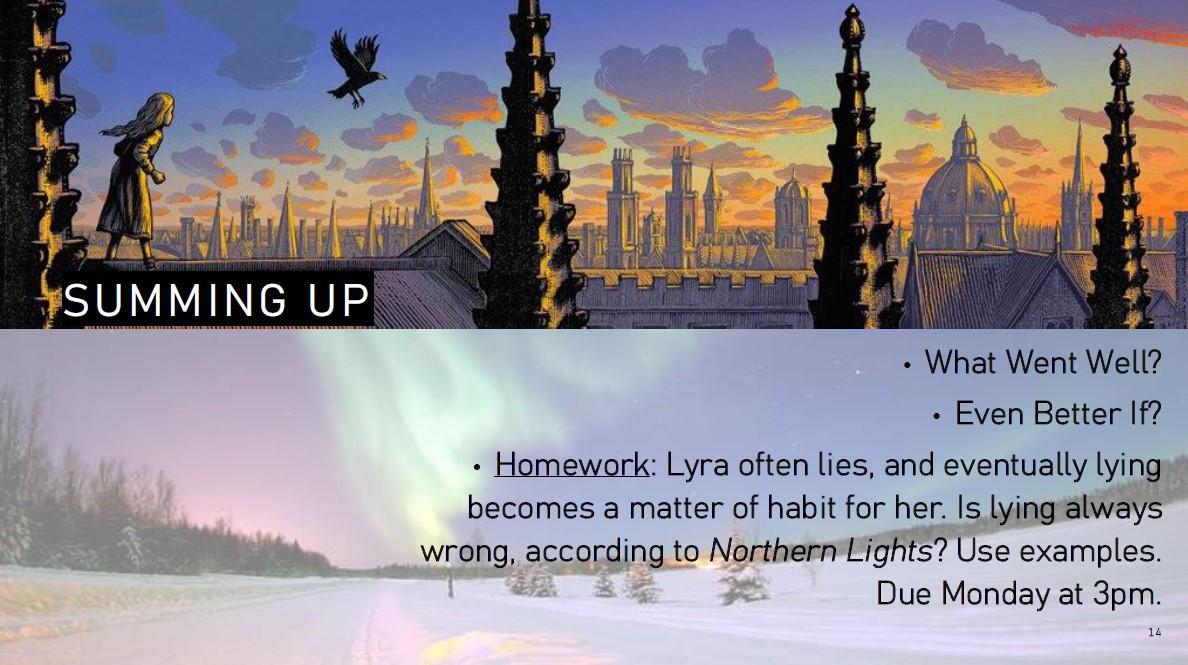
Attachments:
You must be logged in to view attached files. -
at 10:48 #27948
 YunshuParticipant
YunshuParticipant<span style=”text-decoration: underline;”>Lying</span>
Lying isn’t necessarily a bad thing, is it? In Northern Lights, Lyra lies a lot of times and her lies help her to avoid adults finding out her real aims and what she really cares about. If Lyra had told the truth every time she was questioned, how could she have hidden some of her secrets, like when she was captured and taken to the Experimental Station? If she had told the men that she was Lyra Belacqua, they would have known what she was up to and reported her to Mrs Coulter. Instead, feigning to be someone else, she told them that she was “Lizzie Brooks”. This helped her keep her true identity hidden until Mrs Coulter came and she lied again to her telling her things that hadn’t happened and therefore pretending to be unknowing of the schemes and plots of the gobblers. If she had told the truth to Mrs Coulter, about everything she had done with the gypsies and Iorek Byrnison, Mrs Coulter would have probably dealt with her and had her separated from everyone else to hide the schemes of the gobblers.
Lying helped Lyra save Iorek Byrnison and she tricked the bear king, Iofur Raknison. She pretended she was a daemon and hid when she consulted the alethiometer. If she hadn’t lied and told the truth, Iofur would have killed her or imprisoned her and Iorek would have been dead.
In summary, lying isn’t always wrong as it can help hide things that are best kept to oneself and not everything has to be shared with everyone. This is shown in Northern Lights and Lyra Belacqua carries deadly secrets on her shoulders and keeps them safe and hidden through lying.
-
at 20:06 #27991
leyan
ParticipantThis is for week 1 of Northern lights.
In my parallel world, men travel in small groups in boats to scavenge for food. The children learn at home and women prepare food and knit clothes. All weapons are made from a perplexing, silver substance that turns watery at night, but rigid and robust in daylight. Humans do not live independently, instead, they live in small tribes, as they think living independently is dangerous and you will not have protection alone.
Most of the land is covered in luscious grass and excellent soil. Exotic trees are scattered everywhere around the world, which provides tribes with the most succulent and delectable fruit. In this world, instead of auroras, they have brilliant flashes of light, which last seconds before fading away into the darkness. The beaches have amethyst-purple water, which was created by algae slowly fading into the water. Forests are lurking with the most dangerous animals, creatures so terrifying, once you stare at them in your eyes, they will leap up and shred you to pieces, then feasting on everything, bones, organs and your brain.
Most things are similar in the stone age to this country, they hunt wild animals in groups, scavenge for food and build tools with mysterious objects. They do not have a currency, they barter for things like cows that kill each other. For them, it was immensely fun to put these cows in a ring to watch them try to kill each other to their deaths.
-
at 16:38 #28058
-
-
at 10:13 #27994
Alastair
ParticipantDear Beth,
Merry Christmas to you and your family!
I really enjoy the course and appreciate your remarks on my weekly homework assignments.
Kind regards
Alastair
<p style=”text-align: center;”>. . . + . . .
. . . # . .
. . ### . . .
. . “#:. .:##”##:. .:#” . .
. . “####”###”####” .
. “#:. .:#”###”#:. .:#” . . .
. “#########”#########” . .
. “#:. “####”###”####” .:#” . .
. . “#######””##”##””#######” .
.”##”#####”#####”##” . .
. “#:. … .:##”###”###”##:. … .:#” .
. “#######”##”#####”##”#######” . .
. . “#####””#######””#####” . .
. ” 000 ” . .
. . . 000 . . .
.. .. ………………O000O…………………… ……</p>Attachments:
You must be logged in to view attached files.-
at 17:09 #28060
-
-
at 21:23 #28028
 𝐉𝐞𝐬𝐬𝐢𝐞Participant
𝐉𝐞𝐬𝐬𝐢𝐞ParticipantHi Beth,
Here is my homework. An early but warm Christmas greeting to you!
Thank you for everything so far,
Jessie
-
at 21:23 #28029
 𝐉𝐞𝐬𝐬𝐢𝐞Participant
𝐉𝐞𝐬𝐬𝐢𝐞ParticipantLying, a matter that is blurted out with conceit, is usually counted as a consequential matter. However, is it all bad? Does it have any benefits? In Philip Pullman’s book Northern Lights, protagonist Lyra is caught to be fibbing too many times in the book. However, sometimes it is for her good, her life.
When Lyra lies, she is often protecting herself from dangers and harm. For example, when she is found and taken to Bolvangar (the station in the North), the young heroine lies about her identity (claiming she is Lizzie Brooks) in order to keep herself safe. Not only that, near the end of the book, the child is held captive in Svalbard when Roger, Serafina Pekkala, Iorek Byrinson and Lee Scoresby try to save Lord Asriel. Then, when things seem hopeless, the important girl uses her skill, wit and cunning to help both Lord Asriel and Iorek. She coaxes the bear king to think that she is a “daemon” of Iorek and wants to be Iofur’s. Her further coaxing plans revolve into a tight battle where Iorek conquers and becomes king.
Furthermore, as we can spot many times, Lyra only lies to those who are doing no good and is an enemy -Mrs Coulter, Iofur Raknison. However, it is common knowledge that she values friends and never lies to faithful individuals: John Faa, Farder Coram, Ma Costa, Iorek Byrnison, or Serafina Pekkala.
In conclusion, it can be observant that lying does have some benefits, especially when you are in grave danger. However, lying to close friends or family breaks bonds and is most definitely not beneficial.
-
at 17:59 #28063
-
-
at 17:37 #28062
 YunshuParticipant
YunshuParticipantHi Beth,
Merry Christmas and a Happy New Year! Thanks for the course 🙂
I won’t be able to attend the Wednesday lesson since I’m going on holiday on Wednesday and setting off really early.
Kind Regards,
Yunshu
-
at 19:56 #28076
Beth
ParticipantSummary for Lesson 12
In today’s class we completed our work on Northern Lights, concluding our autumn course. We spoke today about the inspiration we could take from Pullman’s writing- thinking about his characterisation, setting, themes and plot. We began with a discussion of character, with the class inventing their own Pullman-esque characters and thinking about their reactions to his characters. Moving on we spoke about setting, before reading an article written by someone whose life was changed by Northern Lights, and discussing what the class felt they could take forward from this novel. They then wrote a paragraph imagining what might happen next after the end of the story, using Pullman’s style to inspire them. Finally we did a fun dramatic task where the class gave advice to Lyra and Pan, with one class member acting as saboteur and the others having to catch them out. Amazing work today everyone- as always!- it was a joy to work with you all. You were all creative, imaginative and inspired throughout class today and throughout the past twelve weeks. Well done- you should all be very proud of yourselves and I hope to see you in our next course! 🙂
Homework
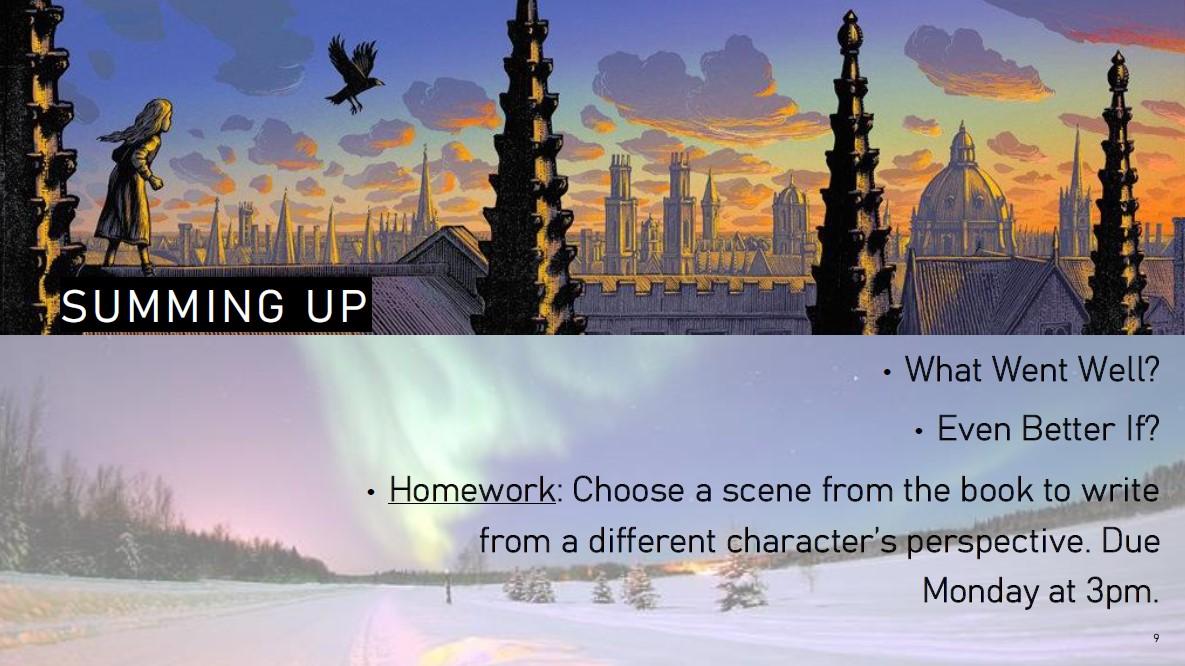
Attachments:
You must be logged in to view attached files. -
at 10:12 #28093
 𝐉𝐞𝐬𝐬𝐢𝐞Participant
𝐉𝐞𝐬𝐬𝐢𝐞ParticipantHi Beth,
Thank you for the course. I enjoyed all the lessons on the different four books.
Happy New Year! 🎉
Best wishes,
Jessie
-
at 10:12 #28094
 𝐉𝐞𝐬𝐬𝐢𝐞Participant
𝐉𝐞𝐬𝐬𝐢𝐞ParticipantChapter 1:
“Lyra, Lyra are you sure we won’t get into trouble, we were so close to getting in trouble when we stole the cakes in the kitchen yesterday!” I whispered in a scared voice.
“Oh Albert, how cowardly you are. Sneaking into the Retiring room is what we call fun. Picking apples is ever so boring,” replied Lyra carelessly.
Not knowing much about Oxford College, I tailed behind Lyra and her daemon Pan as they swiftly moved through the dim Hall, taking care to keep out of sight of the kitchen. The circular dining tables were already laid, where the glasses and plates lay patiently. Then past the next hallway, where pictures of former Masters and scholars watched over the college.
It was only when Pan asked if Lyra was taking it seriously I thought I wasn’t the only scared one.
“They’re making far too much noise in the kitchen, it would be impossible for them to hear us, even if we were raiding a pie from Cookie. Anyway, Albert over here.” Lyra replied as if she did this frequently.
I put my ear towards the door. I could hear voices and Lyra followed.
A deep voice said, “Has Lord Asriel arrived yet?”
It was the Master. I could recognise that voice a mile away. As I held my breath, I could see through the door hole that the servant’s daemon (a dog) was sitting quietly on its feet. Pixie, who was perched on my shoulder, looked in disgust. As an owl, she disliked dogs.
“No, Master,” said the Butler. “Not a word from him. I shall go to the hall now and see how things are going. “ and he left the room through the opposite door.
What I saw next, however, blew my mind and shocked Lyra completely. The Master took a piece of folded paper out of his pocket and laid it on the oak table. He took the cork out of a wine bottle and poured a stream of powder into the brim before tucking the paper back into his pocket.
“Did you see that, Albert?” Lyra asked, her voice trembling for once.
I nodded vigorously.
“The steward’s bell!” I said. “Quick, in the cupboard!”
Not wanting to startle Lyra, I thought to myself, was that poison? I couldn’t be sure. What was wrong with the Master. I knew the Master as a wise, contemplative person who knew a bit of everything. He had greeted me kindly with a warm smile when I first arrived, I had simply known that he was a good man. I sat there uneasy, waiting for what would come next.
-
at 14:18 #28146
-
-
-
at 14:37 #28123
Alastair
ParticipantDear Beth,
I attached my writing assignment for Week 12.
Wishing you a very Happy New Year!
Thanks again for the lessons and your meticulous remarks.
Kind regards
Alastair
Kind regards
Alastair
Attachments:
You must be logged in to view attached files.-
at 14:36 #28148
-
-
-
AuthorPosts
- You must be logged in to reply to this topic.
